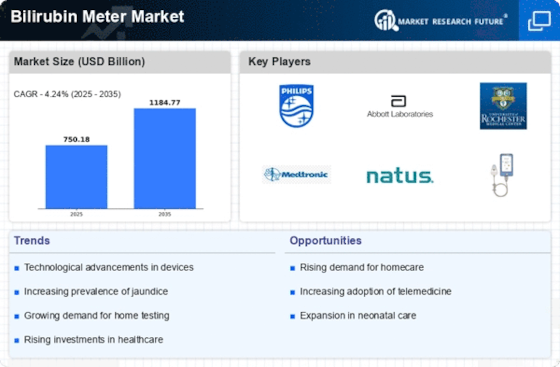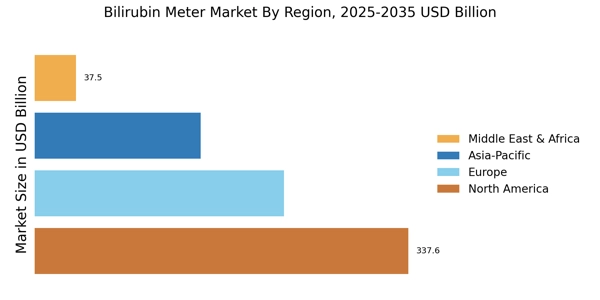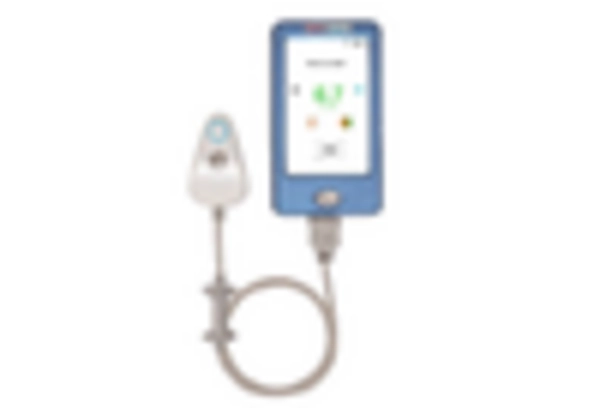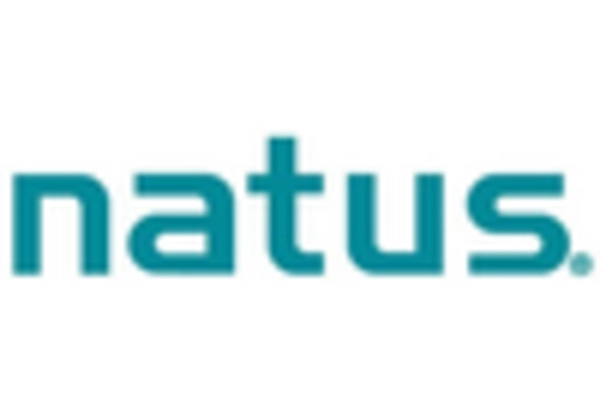Growing Awareness of Preventive Healthcare
The increasing emphasis on preventive healthcare is driving the growth of the Bilirubin Meter Market Industry. As healthcare systems shift towards proactive management of health conditions, the importance of early detection of jaundice in newborns becomes paramount. Parents and healthcare professionals are becoming more informed about the risks associated with untreated jaundice, leading to a higher demand for bilirubin meters. This trend is further supported by public health campaigns aimed at educating caregivers about the signs and symptoms of jaundice. Consequently, the market for bilirubin meters is likely to expand, as healthcare providers seek to equip themselves with the necessary tools to ensure timely interventions and improve patient outcomes.
Increasing Prevalence of Neonatal Jaundice
The rising incidence of neonatal jaundice is a primary driver for the Bilirubin Meter Market Industry. According to health statistics, approximately 60% of newborns experience some form of jaundice, necessitating effective monitoring solutions. This condition, characterized by elevated bilirubin levels, requires timely intervention to prevent complications. As awareness of neonatal health issues grows, healthcare providers are increasingly adopting bilirubin meters to facilitate early diagnosis and treatment. The demand for these devices is expected to surge, as hospitals and clinics seek to enhance patient care and reduce the risk of severe outcomes associated with untreated jaundice. Consequently, the Bilirubin Meter Market Industry is likely to witness substantial growth, driven by the need for reliable and efficient monitoring tools.
Technological Advancements in Medical Devices
Technological innovations are significantly influencing the Bilirubin Meter Market Industry. The introduction of advanced bilirubin meters, which offer enhanced accuracy and user-friendly interfaces, is reshaping the landscape of neonatal care. These devices often incorporate non-invasive measurement techniques, reducing the need for blood draws and minimizing discomfort for infants. Furthermore, the integration of smart technology allows for real-time data analysis and remote monitoring, which can improve clinical decision-making. As healthcare facilities increasingly prioritize patient-centered care, the demand for technologically advanced bilirubin meters is expected to rise. This trend indicates a promising future for the Bilirubin Meter Market Industry, as manufacturers continue to innovate and meet the evolving needs of healthcare providers.
Rising Investment in Healthcare Infrastructure
The ongoing investment in healthcare infrastructure is a crucial driver for the Bilirubin Meter Market Industry. Governments and private entities are increasingly allocating resources to enhance healthcare facilities, particularly in developing regions. This investment often includes the procurement of advanced medical devices, such as bilirubin meters, to improve diagnostic capabilities. As healthcare systems expand and modernize, the demand for reliable and efficient monitoring tools is expected to grow. This trend suggests a favorable environment for the Bilirubin Meter Market Industry, as manufacturers are likely to benefit from increased orders and partnerships with healthcare institutions seeking to upgrade their equipment.
Regulatory Support for Medical Device Innovation
Regulatory bodies are playing a pivotal role in shaping the Bilirubin Meter Market Industry by fostering innovation and ensuring safety. Streamlined approval processes for new medical devices encourage manufacturers to develop and introduce advanced bilirubin meters to the market. This regulatory support not only enhances the availability of innovative products but also instills confidence among healthcare providers regarding the efficacy and safety of these devices. As regulations evolve to accommodate technological advancements, the Bilirubin Meter Market Industry is poised for growth, with an increasing number of devices entering the market to meet the rising demand for effective jaundice monitoring solutions.

















